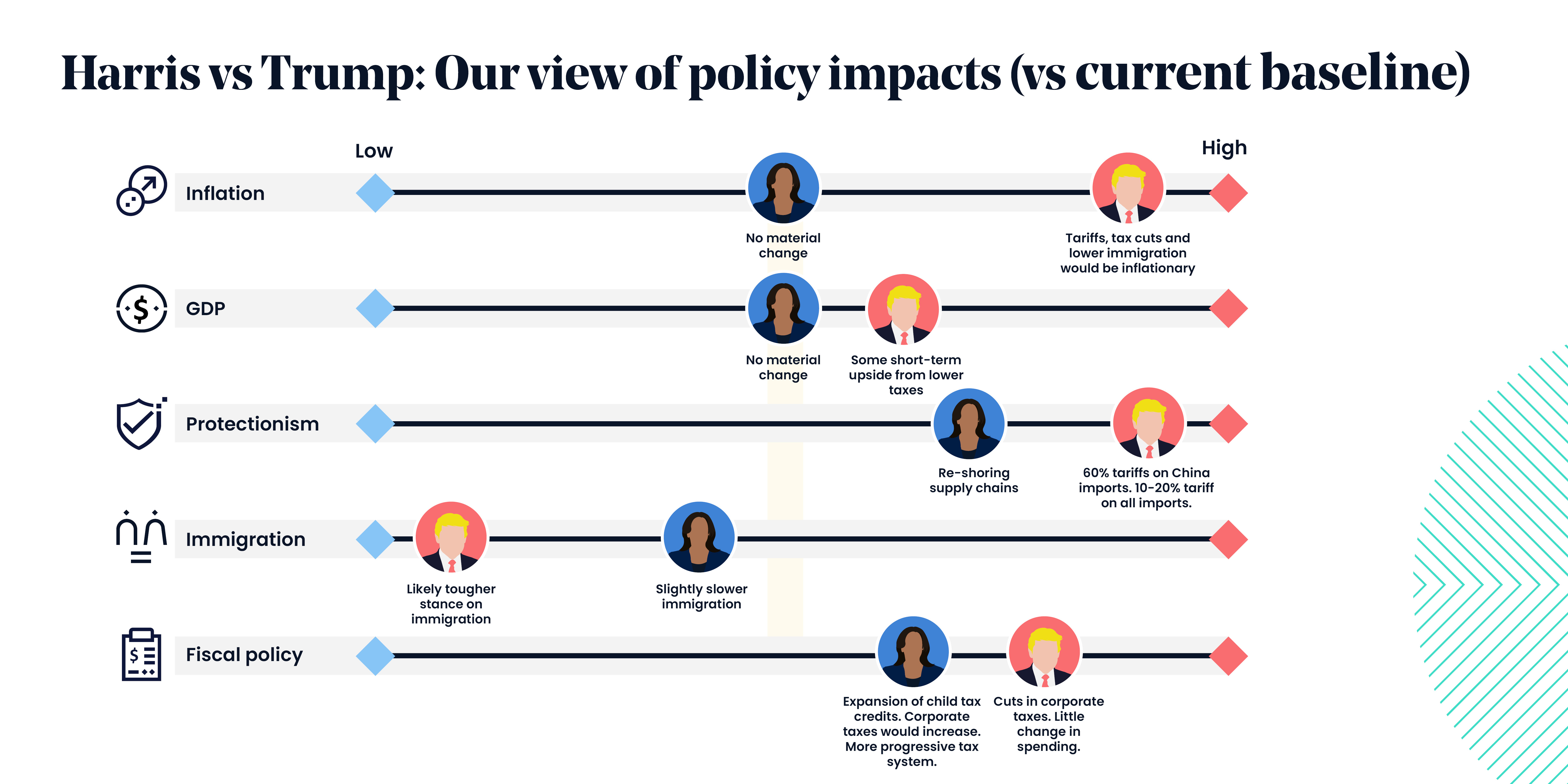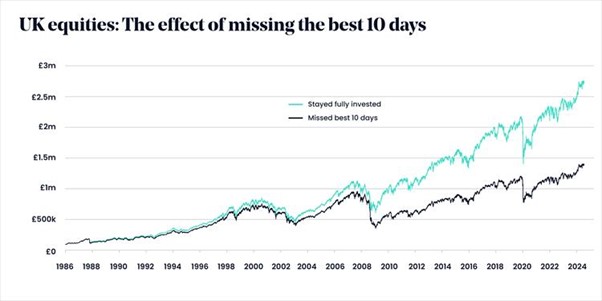[ad_1]
It’s often the case the press is focused more on the candidates than the policies. We must remain disciplined and remember it is fiscal spending plans and regulations that can materially impact markets over the longer term.
Arguably the most important election this year is still to come: Trump versus Harris in the US on Tuesday 5 November 2024. As the campaigning ploughs ahead, three things are becoming increasingly clear:
1. This is likely to be a close election.
2. The potentially large borrowing requirement of both Harris and Trump appears, so far, not to be of significant concern to the financial markets. For us, we believe it could store up potential future volatility for US government bonds.
3. The results could have far-reaching implications for industries sensitive to regulation.
Uncertainty principle: contentiousness matters most.
Swing states
The result of the US election hangs in a delicate balance and is expected to be decided by seven key swing states: Arizona, Georgia, Michigan, Pennsylvania, Wisconsin, Nevada, and North Carolina. These states are critical because they hold significant electoral votes and are highly competitive. As of mid-October, polling data shows a tight race – one too close to call. This can create heightened market uncertainty.
Demographics matter
Both the Democrats and Republicans must navigate a complex and fascinating demographic landscape to secure victory in 2024.
In our view, the Democrats need to energise younger voters, ethnic minorities, and women, particularly in suburban areas, while emphasising issues like economic equality, healthcare, and social inclusion.
Meanwhile, it appears the Republicans must appeal to white non-college voters, maintain their rural strongholds, and make gains among Hispanic and working-class voters.
Both parties will need to sway moderate and independent voters in key swing states, as these groups are likely to determine the outcome in closely contested areas.
Congress
The US election is more than just a presidential race. The balance of power within the US Congress affects the ability of any new government to enact change. A split Congress, as we’ve seen over the past few years, may limit sweeping policy changes, reducing the scope of regulatory shifts. However, unified control of the White House and
Congress by one party could lead to significant legislative changes, particularly in areas like fiscal policy, infrastructure spending, and environmental regulation.
A split Congress often adds to the uncertainty of US policy actions, so can also serve to unsettle markets, at least temporarily. This may be particularly true of this election, where anticipation has grown over whether a definitive outcome will be had – or even agreed in 2024.
Turning the page: November to January
The 2024 election results will have far-reaching consequences beyond November, particularly in the lead-up to January’s inauguration.
Investors will closely monitor policy shifts, as the first 100 days will be critical in shaping the market landscape and setting the tone for economic growth, inflation management, and sector performance for the coming years. Whether it’s a Harris or Trump presidency, markets will react swiftly to the policy direction set during this period.
A Harris-led administration is expected to prioritise social inclusion, climate action, and economic equity. This could boost sectors like green energy but may increase regulation on fossil fuel and technology companies.
In contrast, a Trump presidency would likely focus on deregulation, higher tariffs on foreign goods, tax cuts, and policies favouring traditional energy sectors, potentially boosting short-term market confidence but raising concerns over geopolitical stability and fiscal discipline.

As the world’s largest economy, the US plays a central role in global markets. Shifts in leadership or policy can impact everything from economic growth and inflation to fiscal and monetary policy to international trade and foreign relations.
Our view: Navigating the year of the election
In the run up to political events, investors need to be wary of forecasting results but prepare their portfolios for any unintended risks.
As always, our approach is to manage risk and think in scenarios and probabilities rather than speculate on one specific outcome. Still, we remain aware to the fact the bond market is particularly vulnerable at the moment given the debt and deficit trajectories of US public finances.
Rising deficits and potential fiscal challenges, exacerbated by either candidate’s fiscal policies, will place the bond market under scrutiny. To contextualise these shorter-term risks with our longer-term views, we tend to look to valuations.
Whether it’s trade policy, defence spending, or foreign relations, the next administration’s decisions will have global ramifications. Yet, as always, we advocate a medium-term focus, not short-term speculation.
After all, history demonstrates the benefits of staying invested. A £100,000 investment made in 1986 would have grown to £2.5 million in real terms by the end of September 2024. However, missing just the 10 best performing days over that period would have reduced the final value by £1.25 million – a substantial difference that underscores the potential long-term cost of trying to time the market.

Source: Macrobond data to 07/10/2024. Total return in GBP. Based on an initial investment of £100k. UK equities represented by FTSE All Share Index.
Please note it is not possible to invest directly into the FTSE All Share Index and the figures shown do not take into account any charges applicable to the appropriate investment wrapper or any relevant tax charges. The value of an investment with St. James’s Place will be directly linked to the performance of the funds selected and may fall as well as rise. You may get back less than the amount invested.
Past performance is not indicative of future performance.
Source: London Stock Exchange Group plc and its group undertakings (collectively, the “LSE Group”). © LSE Group 2022. FTSE Russell is a trading name of certain of the LSE Group companies. “FTSE Russell®” is a trade mark of the relevant LSE Group companies and is used by any other LSE Group company under license. All rights in the FTSE Russell indexes or data vest in the relevant LSE Group company which owns the index or the data. Neither LSE Group nor its licensors accept any liability for any errors or omissions in the indexes or data and no party may rely on any indexes or data contained in this communication. No further distribution of data from the LSE Group is permitted without the relevant LSE Group company’s express written consent. The LSE Group does not promote, sponsor or endorse the content of this communication.
[ad_2]
Source link


